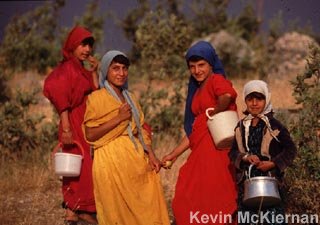|
From "Kurdistan's
Season of Hope"
by Kevin McKiernan
Los Angeles Times Magazine August 23, 1992
The
dingy lobby of the Salam Hotel in Sulaymaniyah has
a single portable heater, a stinky kerosene burner
that gives off more fumes than heat. Several
men wearing overcoats are seated, talking and drinking piala,
sweetened tea in miniature glasses, their AK-47s propped
up against the lobby tables and couches. The
hotel electricity is out again, and the only light
comes through the steamed-up lobby windows past the
X patterns of masking tape on the glass, a reminder
of shelling last fall by the Iraqi army.
 The
clerk at the reception desk is bundled up in a wool
scarf and a white London Fog trench coat. He
is smoking a long, filter-tipped cigarette and calmly
reading a scrap of paper by the dim light of an oil
lamp. He seems a little too urbane for these
surroundings, a David Niven sort who maintains an air
of privilege whatever the adversity. The clerk's
name is Mohammed and, in fact, he has worked in the "better
hotels" of both Baghdad and Basra. He is the
clerk the other hotel people rely on for the infrequent
occasion when an English-speaking guest shows up. The
clerk at the reception desk is bundled up in a wool
scarf and a white London Fog trench coat. He
is smoking a long, filter-tipped cigarette and calmly
reading a scrap of paper by the dim light of an oil
lamp. He seems a little too urbane for these
surroundings, a David Niven sort who maintains an air
of privilege whatever the adversity. The clerk's
name is Mohammed and, in fact, he has worked in the "better
hotels" of both Baghdad and Basra. He is the
clerk the other hotel people rely on for the infrequent
occasion when an English-speaking guest shows up.
We
have an exchange going, Mohammed and I. He often
asks for information on getting U.S. visas and for
other suggestions on how he and his family might get
out of Iraq. In return, he sells me Iraqi dinars
at the attractive black market rate and lets me use
a scanning device behind the reception desk that is
supposed to detect counterfeit money. (With both
the CIA and Iran flooding Iraq with phony bills to
destabilize the economy, counterfeit dinars are rampant.)
Mohammed
also gives me tips, warning me, for example, to double-check
bottles of drinking water to make sure the seals are
unbroken. The water is particularly dirty since
the Allied bombing of the treatment plants. Some
unscrupulous vendors, he says, are refilling the blue
plastic bottles with ordinary tap water. This
is not a good place to get sick.
Six
armed guerrillas collect me at the hotel and drive
me to the mountain headquarters of their leader, Jalal
Talabani, the head of the Patriotic Union of Kurdistan. Two
of the guerrillas work in the Sulaymaniyah hospital,
which explains why we are riding in a large ambulance
that, incidentally, bears Kuwaiti license plates. Apparently,
the Kurds captured it from the Iraqi army, which in
turn had captured it from Kuwait. The shiny ambulance
is a 1990 Chevrolet, distinguished by a bullet hole
in the windshield and a stretcher full of machine guns
in the back.
|

